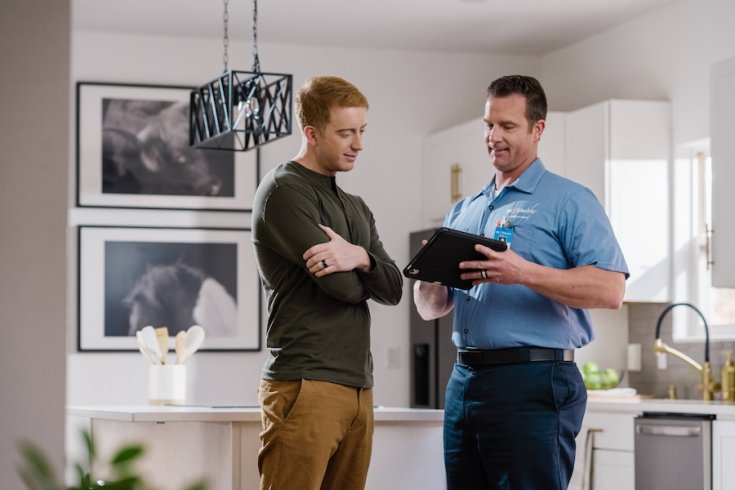You may have heard terms like GFI and GFCI regarding electrical outlets. How are they different, and when should you use each one? Understanding electrical outlet repair issues is vitally important. Mr. Electric helps explain what distinguishes GFI and GFCI outlets, why they're essential components of home safety, and more.
What Is a GFI Outlet?
When you plug something into a GFI outlet, it constantly monitors the flow of electricity. If it senses a problem—like if the electricity is flowing where it shouldn’t, such as through water or a person’s body—the GFI outlet cuts off the power immediately.
You’ll often find GFI outlets where water is present, like kitchens, bathrooms, laundry rooms, or outdoor areas. Water and electricity don’t mix, so having GFI outlets in these areas is necessary. If you plan to replace any electrical outlet in these spaces, install GFI outlets for added safety.
What Is a GFCI Outlet?
Now, let’s talk about GFCI, which stands for Ground Fault Circuit Interrupter. This term refers to the same technology as a GFI outlet, but there’s a slight difference. While a GFI outlet is an individual outlet with this protective feature, a GFCI can protect an entire circuit of outlets. This means that if you install a GFCI outlet at the beginning of a circuit, all the other outlets on that same circuit will be protected.
For example, one GFCI outlet in a kitchen can cover several outlets connected to the same electrical line. If a problem occurs with one outlet in the circuit, the GFCI will shut off the power to all of them, keeping you safe. If you’re unsure whether your home needs GFCI outlets or GFIs, asking a professional electrician for advice is a good idea.
The Key Differences Between GFI and GFCI
Now that we’ve explained what GFI and GFCI outlets are, let’s talk about the key differences between the two:
Individual vs. Circuit Protection:
- A GFI outlet protects only the specific outlet where it's installed.
- A GFCI outlet, on the other hand, can protect all the outlets on a single circuit, even in different rooms.
Location:
- GFI outlets are commonly found in places where they are required by code, such as bathrooms, kitchens, or outdoor areas.
- A GFCI outlet is typically installed at the start of a circuit to provide more comprehensive protection.
Installation:
- GFI outlets are easy to install as a one-off solution for a single spot. If you’re repairing an electrical outlet for a single outlet, you might only need to replace it with a GFI.
- Installing a GFCI outlet, however, requires more planning. It should be placed at the start of the circuit, so it’s often best to have an electrician handle this type of electrical outlet replacement.
Why These Outlets Are Important
Both GFI and GFCI outlets play a crucial role in preventing electrical accidents. Ground faults occur when electricity takes an unintended path, which can be through a person’s body. If you’ve ever felt a tingle or shock while using an appliance, that’s likely a small ground fault.
These ground faults are more likely to occur in wet areas like kitchens and bathrooms because water can conduct electricity. GFI and GFCI outlets stop the electrical current when a problem is detected, significantly reducing the risk of shock or electrocution.
If you ever notice that your GFI or GFCI outlet isn’t working correctly—such as not tripping when it should—it’s essential to get it fixed immediately. An electrical repair service can quickly diagnose the issue and ensure your home is safe. Sometimes, all it takes is a simple electrical outlet repair, but if the outlet is old or damaged, it may need a total replacement.
When Should You Use a GFI or GFCI Outlet?
Knowing when to use each type of outlet is essential for your home’s safety. Here’s a simple guide:
- GFI Outlet: Use this for a single outlet where water is nearby. If you replace just one outlet, a GFI is the way to go.
- GFCI Outlet: A GFCI protects multiple outlets on the same circuit, especially in rooms like the kitchen or bathroom.
If you’re unsure what outlet is best for your home, don’t hesitate to contact an electrician. Electrical codes may vary depending on your area, so having an expert take a look can save you time and ensure that your home is up to standard.
Signs You May Need Electrical Outlet Repair
Over time, outlets can wear out or become less effective. If you notice any of the following signs, it might be time for an electrical outlet repair:
- The outlet feels warm to the touch.
- You notice sparks or hear buzzing when plugging something in.
- The outlet doesn’t provide power consistently.
- The outlet cover is cracked or broken.
Call an electrician to check and see if these issues sound familiar. Sometimes, a simple electrical repair service in Littleton, CO can get things back to normal.
Mr. Electric
GFI and GFCI outlets are vital components of a safe home. Whether you need to replace a single outlet with a GFI or protect multiple outlets with a GFCI, knowing when and where to use each outlet will help keep you safe. Whether you need help with electrical outlet repair or replacement, a professional can ensure everything is installed correctly and safely.








